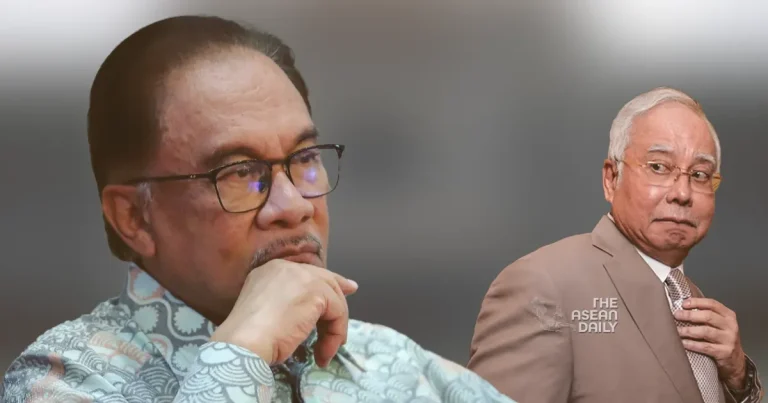18-4-2024 (KUALA LUMPUR) In the ever-captivating spectacle that is Malaysian politics, a familiar figure looms large, casting a long shadow over the nation’s turbulent landscape. Najib Razak, the former prime minister whose fall from grace was once heralded as a triumph for the rule of law, now finds himself inching closer to an improbable resurrection, courtesy of the very system he once exploited. As the nation grapples with the consequences of Najib’s bid to serve the remainder of his sentence under house arrest, a series of revelations have unleashed a maelstrom of controversy, exposing the deep fissures that lie at the heart of Malaysia’s fragile unity government.
At the centre of this unfolding drama is Deputy Prime Minister Ahmad Zahid Hamidi, whose affidavit detailing the purported existence of a royal addendum order granting Najib’s request has sent shockwaves through the corridors of power. Zahid’s claims, vehemently disputed by Trade Minister Tengku Zafrul Abdul Aziz, have thrust Prime Minister Anwar Ibrahim into an unenviable predicament, forcing him to navigate the treacherous waters of royal sensitivities and excessive leniency towards a man once vilified as the embodiment of corruption.
The implications of Najib’s potential release from prison transcend mere legal technicalities; they strike at the very heart of Malaysia’s political fabric, laying bare the intricate web of allegiances, ambitions, and power struggles that govern the nation’s destiny. Analysts warn that Anwar’s government, already teetering on a precarious foundation, could find itself on the precipice of collapse should Najib emerge victorious in his bid for house arrest.
For Anwar, the stakes could not be higher. A decision to challenge Najib’s legal manoeuvre would be akin to defying the sanctity of the constitutional monarchy, a perilous path fraught with risks that could further erode public trust in his administration. Yet, acquiescing to Najib’s demands would deal a devastating blow to Anwar’s commitment to eradicating the systemic corruption that once plagued Malaysia, a pledge that propelled him to power on the crest of a reformist wave.
The political calculus is further complicated by the presence of the United Malays National Organisation (UMNO), the once-dominant party that Najib once led, within the ranks of Anwar’s unity government. With UMNO holding a crucial bloc of 30 parliamentary seats, Anwar finds himself walking a tightrope, balancing the delicate task of maintaining his fragile coalition while simultaneously fending off accusations of capitulation to the very forces he vowed to vanquish.
Analysts paint a grim picture, warning that Zahid’s actions could catalyse a rift between UMNO and the unity government, further destabilising Anwar’s tenuous grip on power. The spectre of UMNO’s withdrawal from the coalition looms large, a scenario that could plunge the nation into chaos and embolden the opposition’s relentless pursuit of power. Yet, even as the political drama unfolds, a sobering reality emerges: Najib’s enduring popularity among segments of the Malaysian populace cannot be ignored.
Despite his tarnished legacy and the gravity of his crimes, the former prime minister retains a fervent following, fuelled by a potent blend of nostalgia, populism, and the perpetual allure of power. This paradox highlights the profound divisions that continue to plague Malaysia’s body politic, where allegiances are often forged not on the bedrock of principle but on the shifting sands of expediency and self-interest.
As the nation holds its collective breath, the prospect of Najib’s comeback looms ever larger, a nudge that in the theatre of Malaysian politics, the curtain never truly falls on those who wield influence and command loyalty. In the end, the saga of Najib Razak’s potential release from prison encapsulates the very essence of Malaysia’s political circus – a spectacle where the lines between justice and pragmatism blur, where the pursuit of power eclipses the pursuit of principle, and where the ghosts of the past refuse to be exorcised.
The outcomes of this critical juncture will echo through the corridors of power for years, influencing the course of a nation perpetually engaged in a cycle of “reinvention and renewal”. Anwar Ibrahim’s administration finds itself at a crossroads, forced to confront the harsh realities of governance and the inescapable pull of political expediency. Will the Prime Minister bow to the pressures of preserving his fragile coalition, or will he remain steadfast in his commitment to upholding the principles of justice and transparency that once propelled him to the pinnacle of power?
As the drama unfolds, Malaysia’s political circus continues to captivate and confound, a tantalising amalgam of intrigue, ambition, and the enduring allure of power. In this ever-shifting landscape, where allegiances are as fleeting as the wind, one thing remains certain: the curtain on Najib Razak’s political odyssey has yet to fall, and the final act of this riveting spectacle promises to be one for the ages.




